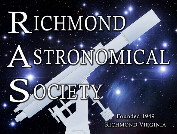Richmond Astronomical Society
739th Consecutive Meeting
April 12, 2011
—–
David Medici called our meeting to order in the Eureka room.
Greeting & Announcements – approximately 26 in attendance at the meeting.
Share Table
A few photos taken through telescopes. Star maps.
Library Report (Virginia Eckert):
No issues and no theme tonight. She brought in 5 books: 2 books about the Sun; Pictorial of Planets; Stars; and a book about Venus (very old collector’s book).
Recent Events:
- SMV Skywatch – Sky had spotty clouds. There was a “fairly modest turnout” to view through telescopes.
- City Point Skywatch (Petersburg National Battlefield) – very good turnout; Tim Streagle, Ray Moody, and Tom K saw and displayed Orion, a few planets, and the moon. A reporter spoke with Tim for about 2 hours, good enough for 1 quote.
Individual observing:
- Several members looked at Orion and the moon. Tim had a few sessions at the scout camp, and a good turnout during the new moon.
- Betty Wilson made 3 presentations to students at Springfield Park Elementary. Each session was for 200 students (600 total) and lasted about 40-50 minutes.
Upcoming Events:
- Bryan Park Skywatch, April 14: Please contact John Raymond at raymond7419@verizon.net if you can help out. Bring your telescopes early to set up.
- Science Museum Skywatch, April 15: Please add your name to the sign-up sheet if you can bring a scope. More information at http://smv.org/events.html. No LiveSky presentation this evening (Planetarium has been down since October). There will be Science on a Sphere at 6pm and 7pm, “Weather on Planets” (35-40 minutes) will be scheduled during the summer vacation.
- Skywatch at City Point, April 23: Public observing session at the City Point Unit of Petersburg National Battlefield. Please let Jim Browder (at president@richastro.org) know if you can help out by bringing a scope and your expertise. More information about the Park’s Skywatch program and the City Point location is available at:
http://www.nps.gov/pete/forkids/skywatch-2011.htm and
http://www.nps.gov/pete/historyculture/city-point.htm - Forestry Center in New Kent County, April 29, 6pm. See Bill Jeffries if you are interested.
- Scotchtown Skywatch, May 6, 8:00 PM, 16120 Chiswell Lane, Beaverdam, VA 23015. Please contact John Raymond at raymond7419@verizon.net if you can bring a scope.
(http://www.apva.org/scotchtown/calendar/) - Astronomy Day, May 7, 12 noon – 4pm, SMV, (no Skywatch this year), RAS club table, IDA booth (dark sky information), make and take sundials, solar observing through telescopes, CCD astro-imaging, a scale model of the solar system, radio telescopes information, light pollution education, a meteorite exhibit, door prizes, a life-like space suit, and the ever-popular soda bottle rocket launch!
